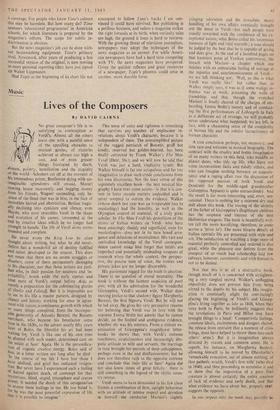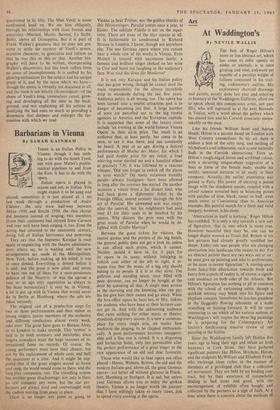111 usi c
Lives of the Composers
By DAVID CAIRNS
No great composer's life is so satisfying to contemplate as Verdi's. Almost all the others leave one with a painful sense of the appalling obstacles to musical genius, of victories -achieved at almost too high a cost, and of even greater things frustrated by death, -disease, poverty, humiliation and the stupidity the world--Schubert cut off at the moment of his tremendous prime, Beethoven dying with un- imaginable splendours still unsaid, Mozart moving house incessantly and begging money from his friends, Wagner succeeding, only be- cause of the fiend that was in him, in the face of incredible hatred and obstruction, Berlioz tragic- -111V declining into cynicism and silence, even Haydn, who most resembles Verdi in the shape and evolution of his career, tormented at the 'end by creative ideas which he no longer had strength to handle. The life of Verdi alone seems rounded and complete.
He never wrote the King Lear he often thought about writing, but what he did never- theless has a wonderful air, of destiny fulfilled and talent developed to the utmost. This does not mean that there are no severe struggles or disasters, some of them permanently damaging to his character, nor that those writers are justi- fied who, in their passion for neatness and 'in- evitability, brush aside the early operas and treat most of Verdi's output before Aida as merely a preparation for the culminating glories of °tell° and lalstafl. But it is impossible not to see in his life a master pattern, designed by chance and history working for once in agree- ment with nature, a continuous growth with which So many things conspired, from the incompar- able .generosity of Antonio Barezzi, the Busseto merchant, who became his benefactor some time in the 18/0s, to the advent nearly fifty years later of Boito, the librettist his art had been waiting for,. Verdi is like one of his own trees he planted with such tender, determined care on the estate at Sant' Agata. He is the personifica- ticin of organic creative energy. Boito said of in a letter written not long after he died: In the course of my life I have lost those I have idolised, and grief has outlasted resigna- tion. But never have I experienced such a feeling of hatred against death, of contempt for that mysterious, blind, stupid, triumphant and craven P°wer. It needed the death of this octogenarian to arouse these feelings in•me. He too hated it, for he was the most powerful expression of life that it is possible to imagine.' This sense of unity and rightness is something that survives any number of unpleasant -re- velations about Verdi's character, because it is independent of them. The oversimplified picture of the rugged patriarch of Busseto, gruff. but kindly, reserved but golden-hearted, has been finally corrected by Frank Walker's The Man Verdi (Dent, 50s.); and we will now be told that Verdi was just a hard, vindictive tyrant. But Walker himself is far too scrupulous and far too ' iinaginative to draw such crude conclusions from 'his own discoveries. Not the least virtue of this supremely excellent book—the best musical bio- graphy I have ever come across----is that it is con- tent to leave certain matters undecided and is never tempted to outrun the evidence. Walker (whose,death last year was an irreparable loss to musicology) had the humility, as well as the Olympian control of material, of a truly great scholar. In The Man Verdi his demolition of the errors of Italian writers OD Verdi—who, have been amazingly shoddy and superficial, even for musicologists—does not in its turn breed arro- gance and delusions of omniscience. His vast and unrivalled knowledge of the Verdi correspon- dence cannot make him forget that letters are imperfect and potentially misleading weapons of research when the whole context, the perspec- tive, the-precise tone of voice, the irdnies and private jokes' are no longer discernible.
His passionate regard for the truth is absolute. There is no question of moral neutrality. The book is without the faintest suspicion of parii pris; with all his admiration for the wonderful Giuseppina, Verdi's second wife, Walker does moving justice to that shadowy figure Margherita Barezzii the first Signora Verdi. But he will not be led away. He gives his very persuasive reasons for believing that Verdi was in love with the soprano Teresa Stoltz but admits that he cannot decide, on the limited and ambiguous evidence, whether she was his mistress. From a minute ex- amination of Giuseppina's magnificent letter- books he shows that, with Verdi's extreme touchiness, suspiciousness and increasingly des- potic attitude to wife and servants, the marriage in time brought her periods of deep unhappiness, perhaps even in the end disillusionment; but he does not therefore rush to the opposite extreme and conclude that their life at Sant' Agata did not also know times of great felicity : there is still something in the legend of the idyllic coun- try retreat.
Verdi seems to have demanded in his few close friends a combination of firm, upright behaviour with an attitude of intense respect and devotion to himself--the conductor Mariani's slightly
cringing adoration and his irresolute, messy handling of his own affairs eventually brought Out the beast in Verdi—but such people were usually rewarded with the confidence of his ex- ceptional nature, what Boito called his 'enormous measure of light and vital warmth'; a man should be judged by the best that he is capable of giving and does give. At the end of a hundred pages on that knottiest point of Verdian controversy, the breach with Mariani—a chapter which one finishes with an unbearable feeling of outrage at the injustice and . sanctimoniousness of Verdi— we are left thinking not; 'Well, so this is what Verdi was really like!' but rather that, as Walker simply says, it was as if some malign in- fluence was at work, poisoning the wells of friendship, and that, though the wretched Marian' is finally cleared of the charges of em- bezzling Teresa Stoltz's money and of conduct- ing the first performances of Lohengrin in Italy as a deliberate act of revenge, we will prObably never understand what happened; we'are left, in fact, with a chastening sense of the complexity of human life and the infinite inconsistency of human character.
A trite conclusion perhaps, butmecessary; and how rare and welcome in musical biography. The contrast with the crudity and feeble imagination of so many writers in this field, who 'muddle or distort dates, who tidy up life, who leave, out some inconvenient fads and falsify others,. and who can imagine nothing •hetsve,en an act:main- lance and a raging affair (see the discussion of the supposed passion of both Verdi and Donizetti for the middle-aged grandmother' Guiseppina Appiani) is quite extraordinary. And the result is far more interesting and, even, sen- sational. There is nothing for a moment dry: and dull about this book. The tracing of the identity of the father of Guiseppina's illegititnate children has the suspense and interest of the best Holmesian exegesis. The book is beautifully writ- ten (all the more horrifying, therefore, to come across a 'prior to'). The more bizarre details of Italian operatic life are presented with style and wit. The satisfaction of watching a huge mass of
• material perfectly controlled and ordered is also great, while the pleasure One derives from the prospect of so much bad scholarship laid low (always, however, courteously and with finesse) is not to be denied.
Not that this is at all a 'destructive book, though much of it is concerned with straighten- ing a very. tangled record. Walker's unflagging objectivity does not. prevent him from being stirred to the depths by his subject. His imagin- ation is continually alight (in convincingly placing the beginning of Verdi's and Giusep- pna's living together as late as 1848, when they were both in Paris, he brilliantly suggests that the revolutions in Paris and Milan may have brought things to a head: 'Compatriotic feelings, common ideals, excitements and dangers shared, the release from restraint that a moment of crisis brings, must have helped to throw them into each others' arms). But it is imagination always directed by reason and common sense. He is superb, for instance, on Margherita 13arezzi; allowing himself to be moved by Oberdorfer's 'remarkable evocation, out of almost nothing. of that pathetic wraith, Verdi's first wife' (who died in 1840), and then proceeding to scrutinise it and to show that the impression of a poor frail creature is almost certainly the entire creation of lack of evidence and early death, and that what evidence we have about her, properly read, suggests the opposite.
In one respect only the book may possibly be
questioned in its title. The Man Verdi is never confronted head on. We see him obliquely, through his relationships with close friends and associates—Mariani, Muzio, Barezzi, La Stoltz, Boito, above all Giuseppina. But it is part of Frank Walker's greatness that he does not pre- sume to settle the mystery of Verdi's severe, secretive character, to generalise and inform us that he was this or this or that. Another bio- graphy will have to be written, incorporating Walker's discoveries; but this book suffers from no sense of incompleteness. It is unified by ,his glowing enthusiasm for the subject and his unique grasp of it, and by the sense which we have— though the music is virtually not discussed at all, and the book is not strictly chronological—of the shape of Verdi's long, tremendous career, grow- ing and developing all the time in the back- ground, and not explaining all his actions or justifying the bad ones so much as providing a dimension that deepens and enlarges the fas- cination with which we read.































 Previous page
Previous page